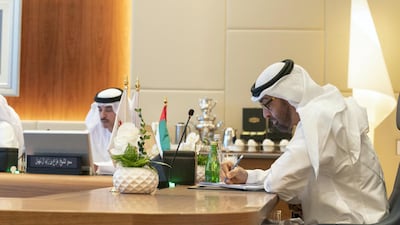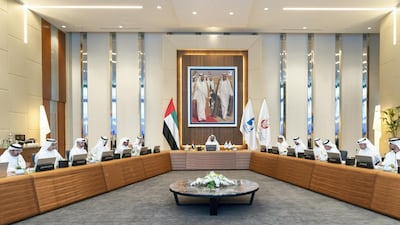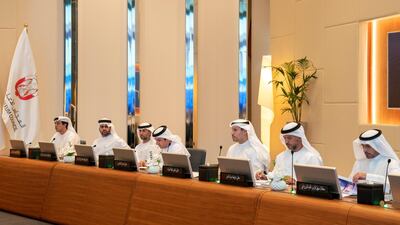Abu Dhabi National Oil Company has discovered large hydrocarbon deposits equivalent to a 1 per cent increase to existing oil reserves and a 7.1 per cent addition to proven gas reserves as it raises investment spend to boost crude output capacity to 5 million barrels per day by 2030.
The discoveries, the largest in recent years for gas, could end the UAE’s dependence on pipeline imports and transform the country into a net exporter of the fuel.
Adnoc said it had found 15 trillion cubic feet of gas and a billion barrels of oil. The UAE had 97.8 billion barrels of proven reserves of oil - 5.8 per cent of world total - as well as 209.7 trillion cubic feet of gas at the end of 2017, according to the latest BP Statistical Review of World Energy.
Abu Dhabi's Supreme Petroleum Council also approved a five-year capital expenditure plan of Dh486 billion for the state-run company to help drive these capacity increases.
“Based on existing data from detailed petroleum system studies, seismic surveys, log files and core samples from hundreds of appraisal wells, estimates suggest these new blocks hold multiple billion barrels of oil and multiple trillion cubic feet of natural gas,” Adnoc said.
Adnoc, which has an ongoing – and for the first time, competitive – licensing round for six blocks, is set to award the exploration and production licences in the first quarter of 2019, it said
The national oil company, which is targeting raising production capacity to 3.5 million bpd by year-end, expects to reach 4 million bpd by 2020, according to the new plan announced on Sunday. The country’s total output for October was 3 million bpd, according to Opec.
"The Supreme Petroleum Council approved Dh486bn in capex to support Adnoc’s five-year growth plans, including its gas strategy to become self-sufficient and a net gas exporter. Adnoc will increase oil production capacity to 5 million bpd by 2030,” Abu Dhabi Crown Prince Mohammed bin Zayed tweeted on Sunday.
The UAE accounts for 4.2 per cent of global production of crude, much of it from Adnoc-owned and operated fields in Abu Dhabi.
On the back of the new discoveries, the UAE would be able to implement a gas strategy that could sustain liquefied natural gas (LNG) production to 2040 and allow Adnoc to develop “incremental LNG and gas-to-chemicals growth opportunities,” the company said.
The development follows on the heels of Adnoc's downstream strategy, which was announced at a conference of global chief executives in May, where it said it was targeting $45bn investment with partners across the refining and chemical segments of its value chain.
_____________
Read more:
Oil and gas could lead the way forward once again for Abu Dhabi's economic diversification efforts
Regional petchems to grow by 60% by 2050, says Adnoc CEO
Adnoc begins production and export of Umm Lulu crude grade
Business Extra podcast: What the Baker Hughes-Adnoc partnership means
_____________
Abu Dhabi, which has reserves of largely sulphurous gas, also known as "sour gas" produces around 60.4 billion cubic metres of natural gas per year, which is not sufficient to meet its annual consumption of approximately 72.2 billion cubic metres.
The country meets some of its gas needs through imports via the Dolphin Gas pipeline, which transports the fuel sourced from Qatar’s massive offshore North Dome gasfield to the Emirates, as well as Oman.






